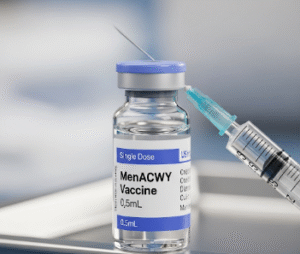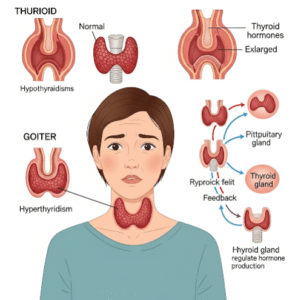Overview
Waterhouse-Friderichsen Syndrome (WFS) is a rare but rapidly fatal condition characterized by bleeding into the adrenal glands, leading to acute adrenal gland failure. It most commonly occurs as a complication of severe bacterial infections, especially meningococcal septicemia. Without immediate medical intervention, WFS can result in shock, multi-organ failure, and death within hours.
What is Waterhouse-Friderichsen Syndrome?
Waterhouse-Friderichsen Syndrome is a form of adrenal insufficiency caused by bilateral adrenal hemorrhage, typically triggered by fulminant bacterial infection. The condition leads to a sudden drop in cortisol levels, which the body needs to manage stress and maintain blood pressure. WFS is most frequently associated with Neisseria meningitidis infection but may also be linked to other severe bacterial infections such as Streptococcus pneumoniae or Haemophilus influenzae.
Symptoms
The symptoms of Waterhouse-Friderichsen Syndrome develop rapidly and include:
- Sudden onset of high fever
- Low blood pressure (hypotension) or shock
- Widespread purpura (purple skin spots due to bleeding)
- Abdominal or flank pain
- Vomiting or diarrhea
- Confusion or altered mental state
- Seizures or coma
- Signs of disseminated intravascular coagulation (DIC)
Causes
WFS is most commonly caused by bacterial infections that lead to sepsis and disseminated intravascular coagulation. The primary causes include:
- Neisseria meningitidis (meningococcal infection – most common)
- Streptococcus pneumoniae
- Haemophilus influenzae type b (Hib)
- Staphylococcus aureus or gram-negative bacilli in rare cases
The overwhelming immune response to these infections damages blood vessels, leading to adrenal hemorrhage.
Risk Factors
Individuals with the following risk factors are more likely to develop WFS:
- Children and young adults (especially infants)
- People with asplenia (no spleen)
- Compromised immune systems
- Close contact with someone who has meningococcal disease
- Lack of vaccination against meningococcus or Hib
- Genetic predisposition to poor immune response
Complications
If not treated promptly, Waterhouse-Friderichsen Syndrome can lead to:
- Septic shock
- Multi-organ failure
- Disseminated intravascular coagulation (DIC)
- Brain damage from prolonged low blood pressure or sepsis
- Death, often within 24 hours of onset
- Permanent adrenal insufficiency in survivors
Prevention
Preventing WFS centers on avoiding severe bacterial infections through:
- Vaccination – against Neisseria meningitidis, Haemophilus influenzae type b, and Streptococcus pneumoniae
- Prophylactic antibiotics – for close contacts of meningococcal cases
- Early treatment – of bacterial infections to prevent sepsis
- Public health measures – in outbreak settings, such as school or military dormitories
- Maintaining general hygiene and awareness of symptoms
Treatment Options in Korea
South Korea has advanced emergency and critical care facilities capable of managing WFS rapidly and effectively. Treatment typically involves:
- Immediate administration of broad-spectrum intravenous antibiotics
- Intravenous hydrocortisone or other corticosteroids to address adrenal insufficiency
- Fluids and vasopressors to stabilize blood pressure
- Treatment for disseminated intravascular coagulation (DIC), including clotting factors and blood products
- ICU admission for intensive monitoring and organ support
- Post-recovery endocrine evaluation, especially if adrenal function is impaired long-term
- Vaccination and infection prevention programs, accessible in pediatric and adult healthcare settings
Major hospitals such as Seoul National University Hospital, Severance Hospital, and Samsung Medical Center offer rapid diagnostics, critical care, and post-infection support for patients with WFS and related sepsis syndromes.













